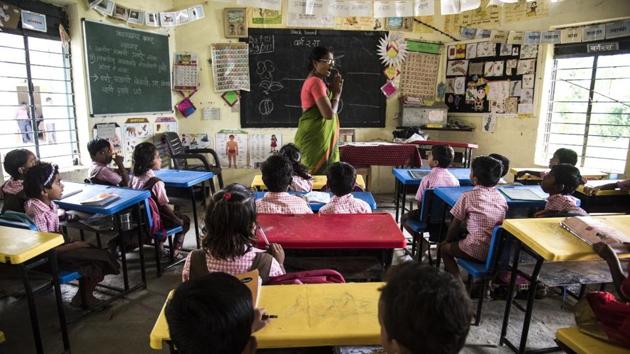NEP and the classroom consensus
It offers an alternative to the exam-centric, rote-learning model, and is strong on the foundations
Regardless of what language students are taught in, the biggest challenge confronting school education in India is its obsession with mastering examinations through rote-learning. On this, there is widespread agreement.

India’s education system operates like a sorting mechanism. The focus in the classroom, as Abhijit Banerjee and Esther Duflo describe it, is on “teaching to the top of the class”. Syllabus completion, rather than subject mastery for all, is the goal to ensure that the best students are made exam-ready. For teachers, pass percentages are the one key metric to which they are held accountable, by the school system and by parents. Rote-learning is the primary means to this end. This is what I call the “classroom consensus”.
The classroom consensus works for the “best” students. After all, India produces some of the world’s brightest minds. They follow the syllabus, master the examinations and progress from grade to grade.
The problem is for those who fall behind. The tyranny of syllabus completion and pass percentages has meant that the classroom simply does not cater to them. Economist Lant Prittchet estimates that four out of five school-going children, who start the school year unable to read, will make no significant progress on reading through the year. For these children, the classroom, as Prittchet describes, is where they serve time, not learn. They progress from grade to grade, but fail to attain even basic literacy and numeracy. This matters a great deal because, as Annual Status of Education Report surveys remind us, most of India’s school-going children are well behind grade-level expectations. Crucially, they fall behind at the start of their learning trajectory — from grade 2 onward. Learning profiles in India are flat. Rote-learning enables some to reach the holy grail of 10th class pass. But for most, even this is an impossible ask.
The real question that needs to be asked of the New Education Policy (NEP) therefore is this: Can it disrupt the classroom consensus?
In its aspiration and in the policy framework it articulates, NEP is genuinely transformational. The document recognises the twin tragedies of a large proportion of children in elementary schools failing to attain foundational literacy and numeracy coexisting with an assessment system that tests “rote memorisation skills” and “requires months of coaching” to master. None of this is new to debates on school education in India. But what makes NEP more promising is the clarity of focus on the problem and the framework it lays out for foundational learning.
Two shifts are noteworthy. First, the emphasis on early childhood care and education, the need to build a curricular and pedagogical framework for early education, linking the anganwadi to the primary school, and introducing a preparatory class in the government school system before class 1. Second, the proposal to address the challenge of foundational literacy and numeracy on a war-footing through a national mission with a clear deadline of 2025. Crucially, the document articulates a framework for shifting the goal post away from the syllabus to what children learn by mandating schools to define stage-wise learning goals, link assessments to these goals, the use of innovative pedagogy and the importance of moving beyond the teacher to bring the community to achieve this mission.
This framework, if implemented well (and this is not trivial), can mark a significant shift in primary schools in India. If the foundation is strong and the basics of education are linked to learning goals, we may finally be able to break away from the tyranny of syllabus completion and pass percentages, at least for primary schools. It is likely that these practices will impact the classroom in higher grades too.
However, the challenge in higher grades is more complex, and this is where the policy pathway proposed is fuzzy. NEP correctly argues for the need to shift the assessment structure away from rote memorisation to learning. But to do this, the school system will have to navigate choppy waters. The stakes are high. Across the globe, tests scores are a predictor for college education and future opportunity. India’s school system is no exception.
The challenge is not so much teachers teaching to test or the coaching classes, but defining what competencies (beyond critical thinking and holistic learning) to test and how teachers and coaching classes can prepare students.
The policy is fuzzy on these details and in its fuzziness exposes a critical limitation in our debates on education. As Rukmini Banerji of Pratham has argued, we are clear about what children ought to learn at the foundational stage. But when it comes to “learning for life” and “learning for work” — the two key goals of middle and secondary education, the debate is yet to be had. To genuinely disrupt the classroom consensus, NEP must become an opportunity to debate this.
Finally, on language. The debate in recent days highlights the tensions between first principles and what the evidence says on the criticality of home/mother tongue in early years; the importance of promoting multilinguism (arguments I strongly agree with); and the reality of parental demand for “English-medium”. These debates contrast sharply with the reality of Indian classrooms which are really “mixed” language, even in English-medium schools. Perhaps in recognition of these tensions, NEP is far more ambiguous on language than Twitter debates acknowledge. But in the final analysis, good policy implementation is about credibly negotiating these tensions.
The ongoing language debate has revealed the urgent need for a larger societal consensus on language and schooling. Our collective ability to bring educators, politicians and parents together to debate this will ultimately shape the future of education in India. Will our public sphere rise to the occasion? This is the challenge that NEP presents us.



